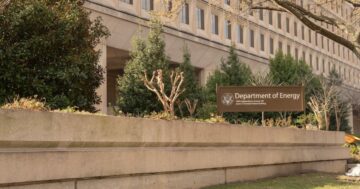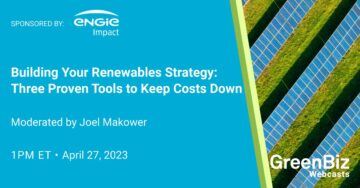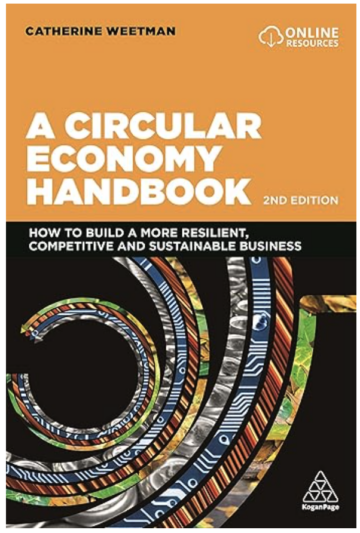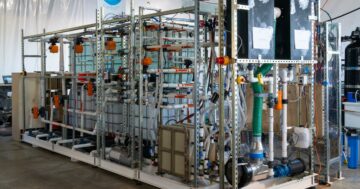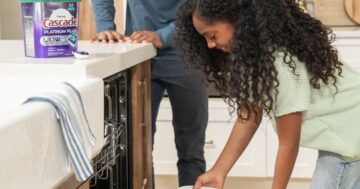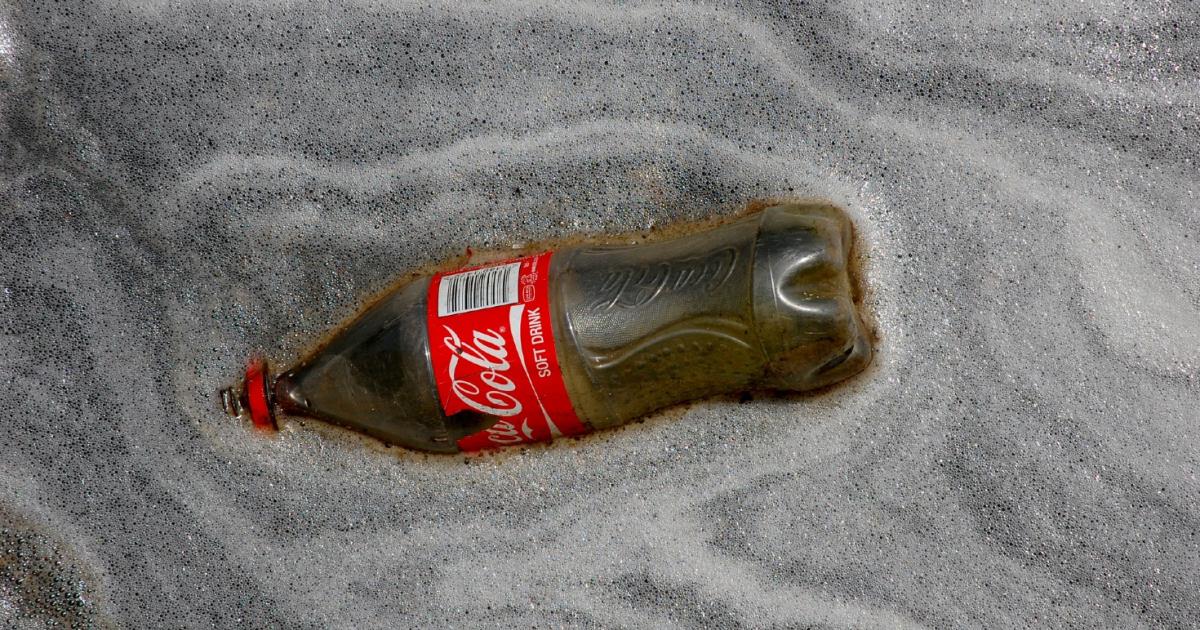
Coca-Cola has been named as the U.K.’s worst plastic polluter by marine conservationists Surfers Against Sewage (SAS) in its latest annual audit to identify the country’s worst sources of branded plastic waste.
The new data published by SAS identifies the “Dirty Dozen” brands, which it says are responsible for 70 percent of branded plastic pollution that the group has collected in the U.K. over a 12-month period.
SAS said that this is the fourth year running that Coca-Cola has topped its list of the U.K.’s biggest plastic polluters, revealing it is responsible for around 17 percent of all branded plastic pollution logged in its audit by citizen scientists.
The charity acknowledged that the high levels of plastic litter from the brand have continued is despite initiatives from Coca-Cola to reduce its plastic pollution, such as the introduction of attached caps across its entire portfolio in May 2022.
As part of its research, the charity analyzed 30,745 individual pieces of plastic litter collected between June 2022 and June 2023. It found that 36 percent of these — or 10,951 items — were identifiably branded.
McDonald’s and PepsiCo were named as the second and third worst polluters by SAS, with the fast food chain overtaking the drinks giant in the list for the first time.
Its audit found that combined, the three biggest polluting brands were responsible for 37 percent of all branded pollution collected during the audit, which it said was down only two percentage points on last year’s figure.
The charity analyzed 30,745 individual pieces of plastic litter collected between June 2022 and June 2023.
Izzy Ross, campaigns manager at SAS, said the findings of the audit were “shocking, but sadly not surprising.”
“Year on year we’re seeing the same culprits responsible for disgusting amounts of plastic pollution on our beaches, and in our cities and countryside,” she said. “This Dirty Dozen of plastic polluting companies need to clean up their act. They must be held accountable for their pollution and driven to do more to adopt circular business models to reduce their plastic and (by extension) their carbon footprint. These industry giants have the power to save or condemn our ocean. At the moment, they’re choosing the latter.”
Tesco, Haribo, Nestle, Mars, Heineken Holding, Carlsberg Group and Red Bull were also named by the audit as being among the U.K.’s top branded plastic polluters.
The audit also highlighted the fishing industry’s role as another leading source of plastic waste, with fishing gear — including lines, nets and ropes — making up 11 percent of polluting items found during the audit. This figure rose to 16 percent of waste pollution on beaches.
According to SAS, this is a 5 percent increase on last year’s figure of 11 percent. Fishing rope was also found to be the third most abundant item amongst unbranded pollution after miscellaneous plastic waste, such as cigarette butts.
This year’s audit also identified vape and e-cigarette products for the first time, with 131 items logged in this category.
The items logged in the brand audit report are all collected by volunteers during SAS’s Million Mile Cleans events, where communities volunteer to clean coastlines, canal paths, bridleways and city streets. SAS said this year more than 4,000 volunteers took part in more than 499 clean-up events.
Following its findings, SAS said it is calling on corporates to “clean up their act” and step up efforts to tackle plastic pollution by taking responsibility for the entire lifecycle of their products, reducing their packaging, and adopting circular business models.
The charity is also urging the government to introduce an “all-in” deposit return scheme (DPS) for drinks containers of all sizes and materials, including glass, rather than the current scheme which is solely for small containers classified as “on-the-go.”
It suggested this scheme could see consumers pay an upfront deposit on products, which would be redeemed on return of the container.
Ross said the planned DRS remained “one of the most effective ways to reduce plastic pollution.”
“DRS schemes have been shown to be highly successful in other countries, and there’s no reason to assume this wouldn’t be the case in the U.K.,” she added. “Unfortunately, the government continues to stall on plans to implement a DRS. In doing so, it is condemning our ocean, beaches and rivers to a further 8 billion extra pieces of plastic a year, as plastic gradually chokes these fragile ecosystems to death.”
Last year SAS released its national action plan to end plastic pollution. The plan set out a series of policy proposals, including calls for legislation to end the production and consumption of non-essential single-use and polluting plastics and that ensure more effective resource use and waste management.
It also called for business models focused on reduction and reuse as well as cultural change across society to tackle littering and the still widespread use of single-use plastic packaging.
In response to being named as the U.K.’s worst plastic polluter, a spokesperson for Coca-Cola said: “It is clear the world is facing a packaging waste problem, and we have a responsibility to help solve it. At Coca-Cola, we’re continuing to work with our partners to encourage more recycling, whilst actively supporting several initiatives aimed at making litter a thing of the past.”
Coca-Cola added that through its World without Waste plan it it is seeking to reduce the amount of packaging it uses, and collect and recycle a bottle or can for each one it sells by 2030.
It said that all its bottles in the U.K. are already recyclable and all of its smaller packs are made from 100 percent recycled plastic, excluding the cap and label.
“We also remain committed to the introduction of a well-designed Deposit Return Scheme, which we know from results in other countries will encourage people to recycle. While we continue to make progress, we are challenging ourselves to do more,” the spokesperson added.
A spokesperson for McDonald’s, named as the U.K.’s second worst plastic polluter, said: “As a business, we continue to make changes to our packaging in order to reduce plastic waste and have already made a number of moves in this area. These include removing plastic McFlurry lids, straws and salad boxes, hard plastic Happy Meal toys, as well as changing to paper packaging for all new toys. Most recently, we replaced plastic cutlery with paper-based alternatives. Over 90 percent of our packaging comes from recycled or renewable sources, and can be recycled, and we actively encourage our customers to dispose of our packaging responsibly.”
In response to the audit and its position as the U.K.’s third worst plastic polluter, a spokesperson for PepsiCo UK said: “We recognize that litter on our beaches is a huge problem, and we know there is a significant role we must play to help address this challenge. It’s why we’ve been supporting the Great British Spring Clean for the last five years and are continuing to invest in innovating our packaging.”
The company added that it has “heavily invested” in removing unnecessary plastic from its multipack products by replacing outer bags with paper, cardboard and tape packaging as it seeks to find a “long-term wide-scale” solution.
PepsiCo UK added that it has an overall goal of eliminating all virgin fossil-based plastics from its crisp and snack bags in Europe by 2030.
A spokesperson for Nestlé, named by SAS as the eighth worst contender, called the SAS audit an “important piece of research on the global issue of plastic litter,” adding that while the results were “not a surprise,” they were also “not at all nice to see.”
“We are aware of the scale [of the problem],” Nestlé added. “However, it is completely unacceptable for [that] packaging to end up as litter in the natural environment; it endangers wildlife, and threatens ecosystems and the food chain.”
Its audit found that combined, the 3 biggest polluting brands were responsible for 37% of all branded pollution collected.
Nestlé said it is working towards plans to have “as close to 100 percent” of its packaging to be designed for recycling by 2025. In 2021, it said it converted 250 million packs of Smarties to recyclable paper packaging and in 2022, it started to transition Quality Street wrappers from dual foil and cellulose to recyclable paper wrappers.
It estimated this could remove almost 2 billion individual pieces of packaging material from its supply chain in the U.K.
“We are determined to reduce single-use packaging and are also exploring solutions to fundamentally change the way consumers receive and enjoy our products,” Nestlé added. “We are actively collaborating with other companies, research institutes, NGOs and governments around the world to find the solutions that are needed to make reports like this a thing of the past.”
A spokesperson from Carlsberg Marston’s Brewing Company (CMBC) said: “Sustainability is a key focus for CMBC, and we are adamant our products should never end up in nature.
“By 2030, we aim to make 100 percent of our packaging recyclable, reusable or renewable and achieve a recycling rate of 90 percent. We have actively made progress towards these targets through innovations like Snap Pack, which reduces our use of secondary plastic packaging by up to 76 percent compared to the previous format — reducing the risk of plastic ending up in nature.”
CMBC added that it “firmly” supports plans to introduce a Deposit Return Scheme (DRS) across the U.K.
Representatives from Tesco, Haribo, Mars, Heineken Holding and Red Bull were contacted for comment but had not responded at press time.
- SEO Powered Content & PR Distribution. Get Amplified Today.
- PlatoData.Network Vertical Generative Ai. Empower Yourself. Access Here.
- PlatoAiStream. Web3 Intelligence. Knowledge Amplified. Access Here.
- PlatoESG. Automotive / EVs, Carbon, CleanTech, Energy, Environment, Solar, Waste Management. Access Here.
- BlockOffsets. Modernizing Environmental Offset Ownership. Access Here.
- Source: https://www.greenbiz.com/article/coca-cola-worst-plastic-polluter-uk
- :has
- :is
- :not
- :where
- $UP
- 000
- 10
- 100
- 11
- 16
- 17
- 2021
- 2022
- 2023
- 2025
- 2030
- 250
- 30
- 36
- 7
- 70
- 8
- 90
- a
- abundant
- accountable
- Achieve
- acknowledged
- across
- Act
- actively
- added
- adding
- address
- adopt
- Adopting
- After
- against
- aim
- aimed
- All
- already
- also
- alternatives
- among
- amongst
- amount
- amounts
- an
- analyzed
- and
- annual
- Another
- ARE
- AREA
- around
- AS
- assume
- At
- attached
- audit
- aware
- bags
- BE
- Beaches
- been
- being
- between
- Biggest
- Billion
- boxes
- brand
- branded
- brands
- British
- bull
- business
- business models
- but
- by
- called
- calling
- Calls
- Campaigns
- CAN
- cap
- caps
- carbon
- carbon footprint
- case
- Category
- chain
- challenge
- challenging
- change
- Changes
- changing
- Charity
- choosing
- Cities
- citizen
- City
- classified
- clear
- Close
- coca-cola
- collaborating
- collect
- combined
- comes
- comment
- committed
- Communities
- Companies
- company
- compared
- completely
- Consumers
- consumption
- Container
- Containers
- continue
- continued
- continues
- continuing
- converted
- corporates
- could
- countries
- country
- CRISP
- cultural
- Current
- Customers
- data
- Death
- deposit
- designed
- Despite
- determined
- dispose
- do
- doing
- down
- dozen
- drinks
- driven
- during
- each
- Ecosystems
- Effective
- efforts
- Eighth
- eliminating
- encourage
- end
- enjoy
- ensure
- Entire
- Environment
- estimated
- Ether (ETH)
- Europe
- events
- excluding
- Exploring
- extension
- extra
- facing
- FAST
- Figure
- Find
- findings
- firmly
- First
- first time
- Fishing
- five
- Focus
- focused
- foil
- food
- Footprint
- For
- format
- found
- Fourth
- from
- fundamentally
- further
- Gear
- giant
- giants
- glass
- Global
- goal
- Government
- Governments
- gradually
- great
- Group
- had
- happy
- Hard
- Have
- heavily
- Held
- help
- High
- Highlighted
- highly
- holding
- However
- HTTPS
- huge
- identified
- identifies
- identify
- implement
- important
- in
- In other
- include
- Including
- Increase
- individual
- industry
- initiatives
- innovating
- innovations
- introduce
- Introduction
- Invest
- invested
- issue
- IT
- items
- ITS
- jpg
- june
- Key
- Know
- Label
- Last
- Last Year
- latest
- leading
- Legislation
- levels
- lifecycle
- like
- lines
- List
- logged
- long-term
- made
- make
- Making
- management
- manager
- Marine
- mars
- material
- materials
- May..
- MCDONALD
- million
- models
- moment
- more
- most
- moves
- must
- Named
- National
- Natural
- Nature
- Need
- needed
- Nets
- never
- New
- NGOs
- nice
- no
- number
- ocean
- of
- on
- ONE
- only
- or
- order
- Other
- our
- ourselves
- out
- over
- overall
- Pack
- packaging
- Packs
- Paper
- paper-based
- part
- partners
- past
- Pay
- People
- pepsico
- percent
- percentage
- period
- piece
- pieces
- plan
- planned
- plans
- plastic
- plastics
- plato
- Plato Data Intelligence
- PlatoData
- Play
- points
- policy
- Pollution
- portfolio
- position
- power
- press
- previous
- Problem
- Production
- Products
- Progress
- Proposals
- published
- quality
- Rate
- rather
- RE
- reason
- receive
- recently
- recognize
- recycling
- Red
- red bull
- reduce
- reduces
- reducing
- reduction
- released
- remain
- remained
- remove
- removing
- Renewable
- replaced
- report
- Reports
- research
- resource
- response
- responsibility
- responsible
- responsibly
- Results
- return
- reusable
- reuse
- revealing
- Risk
- Role
- ROSE
- running
- s
- Said
- same
- SAS
- Save
- says
- Scale
- scheme
- schemes
- scientists
- Second
- secondary
- see
- seeing
- seeking
- Seeks
- Sells
- Series
- set
- several
- she
- should
- shown
- significant
- sizes
- small
- smaller
- Snap
- So
- Society
- solely
- solution
- Solutions
- SOLVE
- Source
- Sources
- spokesperson
- spring
- started
- Step
- Still
- street
- successful
- such
- supply
- supply chain
- Supporting
- Supports
- surprise
- surprising
- Sustainability
- T
- tackle
- taking
- targets
- Tesco
- than
- that
- The
- the UK
- the world
- their
- There.
- These
- they
- thing
- Third
- this
- this year
- threatens
- three
- Through
- time
- to
- took
- top
- topped
- towards
- transition
- two
- U.K.
- Uk
- unfortunately
- unnecessary
- urging
- use
- uses
- Ve
- Virgin
- volunteer
- volunteers
- was
- Waste
- Way..
- ways
- we
- WELL
- were
- which
- while
- Whilst
- why
- widespread
- Wildlife
- will
- with
- without
- Work
- working
- world
- Worst
- would
- wouldn
- year
- years
- zephyrnet


